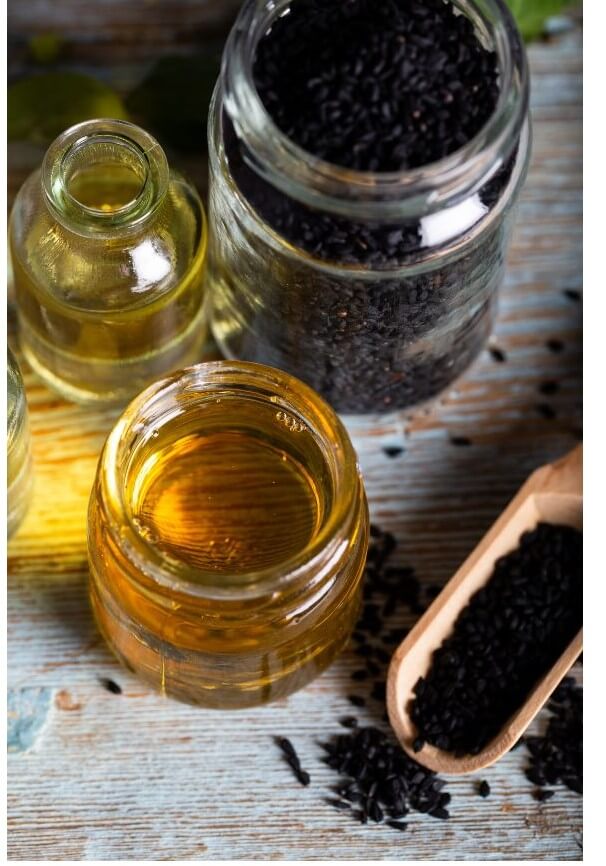7 Incredible Benefits of Black Seed Oil for Women
Black seed oil is a medicinal plant whose usage dates back more than 2000 years, with Queen Nefertiti, renowned for her beauty, reportedly an ardent user–but black seed oil’s benefits go much more than skin deep.
It’s almost impossible to sum up the extensive list of black seed oil’s health benefits, but numerous studies suggest it can help with weight loss, blemish control and skin health, hair growth, seasonal allergies, digestive function, some cancers, and much, much more. Is black seed oil the coveted remedy your routine is missing? Keep reading to find out.
To learn more about the holistic methods for balanced hormones, gut health, and natural beauty, learn more about my amazing new community, the Superwoman Circle.

What Is Black Seed Oil?
Black seed oil, sometimes called black cumin seed oil, comes from the small black seeds of the flowering Nigella sativa plant, and is most often found as an amber-colored oil, or sometimes in capsule form.
Black seed oil, or black cumin seed oil, has been cultivated in Southwest Asia, as well as the Middle East, Africa, and Eastern Europe and used in traditional cultures as a tonic for almost everything from digestive issues, to skin health, to immune function and beyond.
Many modern drugs are derived either directly or indirectly from plants and their compounds, and black seed oil is one such plant with the potential for an incredible amount of healing benefits.
Why Women Should Use Black Seed Oil
Black seed oil has been a staple in Ayurveda, as well as traditional Eastern medicine practice for centuries, for treating ailments such as allergies, sore throat, digestive issues, skin rashes, cancer, and many other maladies.
What gives black seed oil its healing powers?
Black seed oil is nutrient-rich. Black seed oil naturally contains beneficial fatty acids like omega-3, -6, and -9, plus is a rich source of potassium, iron, copper, vitamin E, and B vitamins.
Black seed oil also has immune-regulatory, anti-inflammatory, and antioxidant properties, and contains phytonutrients such as carvacrol, and thymoquinone (1).
Thymoquinone is a potent antioxidant that has been shown to have immune supportive properties and anti-inflammatory capabilities (2).
Benefits of Black Seed Oil in Women’s Health
Black seed oil boasts some impressive and well-researched benefits, including being considered antidiabetic, an antioxidant, immunomodulatory, analgesic, antimicrobial, anti‐inflammatory, a bronchodilator, antihypertensive and neuroprotective.
That’s a pretty impressive list!
Thanks to these properties, black seed oil impacts both the immune system and inflammatory pathways that play a role in many different health conditions.

Traditionally, black cumin seed oil has been used for (3):
- Respiratory health
- Heart function
- Headaches
- Diabetes
- Back pain
- Cholesterol levels
- Weight loss
- Joint pain
- Eczema, skin rashes
- H. pylori infections
- Reproductive and sperm health
A great many of black seed oil benefits are likely due to thymoquinone, a powerful phytonutrient that has been shown to support healing in many different organs and tissues.
You’ll learn more about the benefits of thymoquinone in a moment when you read about these 7 incredible benefits of black seed oil.
1. Black Seed Oil Combats Bad Intestinal Bacteria
Symptoms like gas, bloating, diarrhea, and poor digestion can sometimes be due to an overgrowth of harmful, pathogenic bacteria like H. pylori. Black seed oil, used in combination with honey, has been shown to reduce the growth of H. pylori bacteria within the digestive system, allowing the gut to heal and restore function and comfort (4).
Black seed oil may help relieve stomach cramps, gas, and bloating due to its anti-inflammatory, anti-bacterial, and therapeutic properties (5).
Is an imbalanced gut holding you back from getting healthy or losing weight? Check out why so many women are raving about the Hormone Balance Box featuring Belly Fix.
2. Thymoquinone Can Act Against Some Cancers
Thymoquinone is the naturally-occurring phytochemical (meaning “plant nutrient”) extracted from black seed oil that has demonstrated anti-tumor effects in studies. For example, researchers found thymoquinone can target certain liver cancers, while also enhancing the effects of current treatments with little to no side effects (6).
3. Black Seed Oil Can Boost Sexual Desire
Supplementing with black seed oil has been shown to support hormone balance which can boost libido and sexual desire.
One study reviewed 24 articles and found that black seed oil promotes healthy levels of progesterone and testosterone in women, which are two hormones crucial for fertility and sexual desire (7).
4. It Can Also Support Healthy Sperm Production
Studies examining both fertile and infertile men noted that black seed oil can help sperm swim faster and boost sperm count (3).
5. Black Seed Oil Fights Allergies
Looking for a natural remedy for your seasonal allergies? Black seed oil might just become your new sidekick. Black seed oil is considered immunomodulatory, which means it can support a healthy immune response to triggers such as seasonal allergens.
In one study, more than half the participants noticed an improvement in allergy symptoms such as nasal irritation and inflammation after using black seed oil for 6 weeks (8).
Black seed oil has also made headlines recently for its potential in modulating inflammatory responses in the lungs (2). The medicinal properties of thymoquinone, one constituent of black seed oil, can inhibit the release of histamine, thereby serving to reduce inflammation within the respiratory system.
Does your immune need extra support? Learn how to spot the signs.

6. Black Seed Oil for Glowing Skin
While no one can personally vouch for Queen Nefertiti’s renowned beauty, historical reports claim that she was a “devoted” user of black seed oil, and its natural anti-inflammatory properties likely make it a beneficial choice for skin health (9).
In one study, almost all participants using a 10% black seed oil on their skin noticed reduced blemishes after 2 months (10).
7. Black Seed Oil Can Help Your Hair Grow
Struggling with hair loss or thinning hair? Because black seed oil contains beneficial nutrients and fatty acids, it’s a great choice for a scalp massage to promote hair growth.
Dilute with a carrier oil or apply directly, and massage into the scalp to bring blood flow to hair follicles and nourish the base of your hair shaft.
Restore beautiful skin & hair—Save 40% off the Beauty Box!
Where to Find Black Seed Oil
Have the incredible benefits of black seed oil made you want to get a bottle of this ancient remedy of your very own? The good news is that black seed oil can easily be found in many health food stores and online, but you’ll want to be mindful of quality.
Cold-pressed, minimally processed black seed oil should be stored in a dark-colored glass bottle. You can also find black seed oil softgels in pure oil form, or combined with other oils like hemp seed.
Can I Take Black Seed Oil Daily?
Black seed oil can be taken daily, and most studies use anywhere from 1-3 grams when evaluating maximum benefits.
What To Remember
The benefits of black seed oil are numerous, and it’s been shown to play a role in improving some of the most common health problems, including high blood pressure, diabetes, and pain. Black seed oil has been used for more than 2000 years as an ancient remedy in traditional Chinese medicine and Ayurvedic medicine, and is considered very safe to use daily in many studies.
As always, it’s best to consult your holistic physician about health concerns and before you begin any supplement.
Is black seed oil the right additional to your supplement routine? Which benefits of black seed oil are you most excited about?
For coaching, community, and holistic support, learn more about the Superwoman Circle.
Resources
- https://www.ncbi.nlm.nih.gov/pmc/articles/PMC5633670/
- https://www.ncbi.nlm.nih.gov/pmc/articles/PMC7347483/
- https://www.ncbi.nlm.nih.gov/pmc/articles/PMC6535880/
- https://www.ncbi.nlm.nih.gov/pmc/articles/PMC5292131/
- https://www.ncbi.nlm.nih.gov/pmc/articles/PMC4884214/
- https://www.frontiersin.org/articles/10.3389/fphar.2020.555283/full
- https://mattioli1885journals.com/index.php/progressinnutrition/article/view/7088
- https://pubmed.ncbi.nlm.nih.gov/23855426/
- https://www.hindawi.com/journals/ecam/2016/6075679/
- https://www.sciencedirect.com/science/article/pii/S2352241015000286
